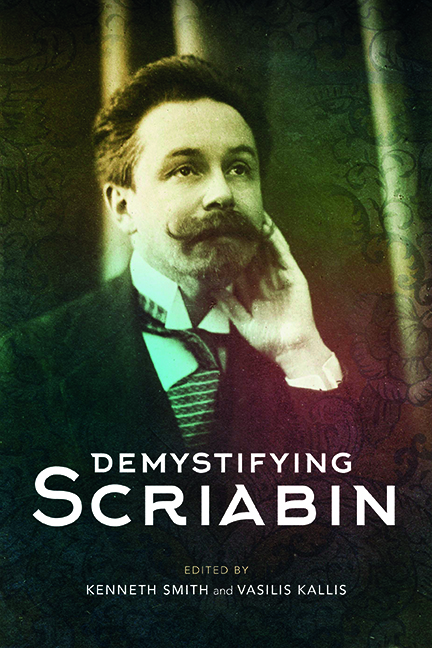2 - Scriabin and the Russian Silver Age
Published online by Cambridge University Press: 07 October 2022
Summary
Reflecting on the cultural ferment of late imperialRussia, philosopher and exile Nikolaĭ Berdi͡aev(1874–1948) recalled,
It was an epoch of the awakening of independentphilosophical thought, the blossoming of poetry,the sharpening of aesthetic sensuality, ofreligious anxiety and searching, of interest inmysticism and the occult. New souls appeared, newsources of creative life were discovered, newdawns were seen, feelings of decline and deathwere united with a feeling of awakening and withthe hope for the transformation of life.
This era, which Berdi͡aev termed the ‘Russian culturalrenaissance’, dismantled traditional divisionsbetween art, literature, philosophy, history, andreligion and abandoned the materialist worldview ofthe previous generation of Russian intellectuals infavour of exploring fundamental metaphysicalquestions underpinning human existence. The term‘Silver Age’, coined by Russian emigre NikolaĭOt͡syp in 1920s Paris to describe earlytwentieth-century literary movements like Symbolismthat rejected the dominant realist aesthetic of theprior age, has been expanded by contemporaryscholars to refer to ‘the entire complex of newtrends in the spiritual-artistic sphere of the firstthird of the twentieth century’. Thinkers andartists of the Silver Age re-established thecentrality of questions concerning spirituality andaesthetics alongside social concerns. As historianCatherine Evtuhov has argued, this era witnessed amultifaceted quest perhaps best summarised by thepenetrating query posed by philosopher VladimirSolov’ev (1853–1900) in his 1897 work Justification of the Good:‘Does our life ultimately have any kind of meaning?’For members of Russia's late imperial artistic elitelike composer Alexander Scriabin, for whom art andlife were fundamentally intertwined, this questionmight be better expressed: Doesartistic creation ultimately have any kind ofmeaning?
For the young Berdi͡aev, who witnessed the creativeflourishing of Russian culture alongside the growingthreat of world war in 1914, it was the act ofartistic creation that provided a positive answer toSolov’ev's question. Previous epochs of humanhistory would be transcended and the full purpose ofhumanity achieved through free artistic creation,Berdi͡aev asserted in 1914. Art – the imperfectphysical embodiment of a higher realm of Beauty –would be replaced by theurgy (‘divine action’), thespiritualization of the material realm through theinspired creative activity of human artists giftedwith mystical insight.
- Type
- Chapter
- Information
- Demystifying Scriabin , pp. 26 - 45Publisher: Boydell & BrewerPrint publication year: 2022



